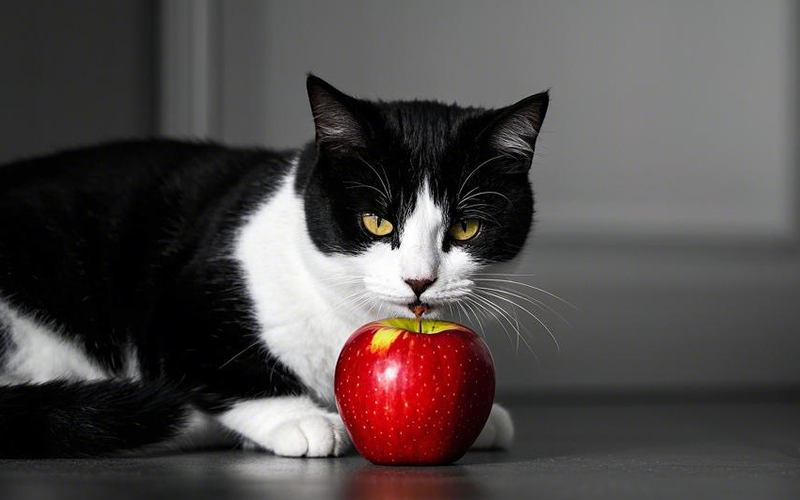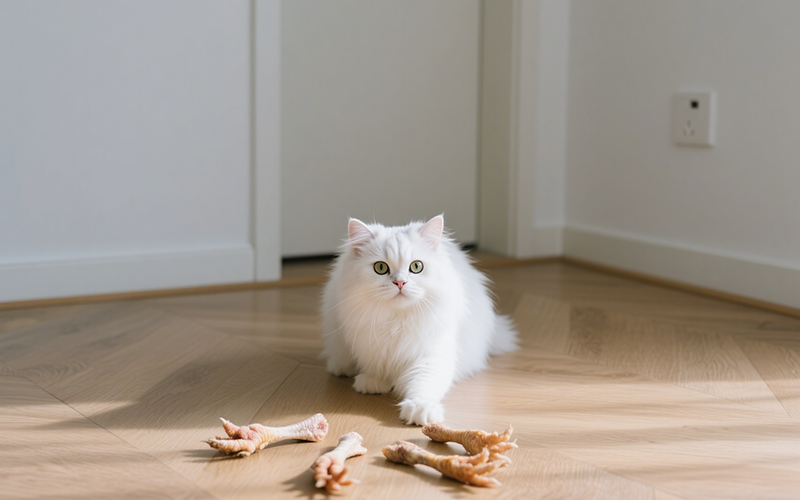Can Cats Eat Apples? Is It Safe for Your Feline Friend?
- 1 Mar 2025 11:09
As a cat owner, you might find yourself snacking on an apple and wonder, can cats eat apples? The good news is, yes, cats can eat apples, but there are important things to keep in mind before offering this fruit to your feline companion.
In this article, we will discuss the benefits, potential risks, and how to safely serve apples to your cat. Let’s dive into everything you need to know.

Nutritional Benefits of Apples for Cats
Apples can offer some nutritional benefits for cats when given in moderation:
✔ Vitamins – Apples contain vitamin C and vitamin A, both of which support your cat’s immune system, vision, and overall health. While cats typically produce their own vitamin C, small amounts from food can still be beneficial.
✔ Fiber – Apples are a good source of dietary fiber, which can aid in digestion and help regulate your cat's bowel movements. Fiber can also promote a feeling of fullness, making it helpful for weight management in some cats.
✔ Hydration – Apples have a high water content, which can help keep your cat hydrated, especially if they aren’t drinking enough water on their own.
Risks of Feeding Apples to Cats
While apples can be a healthy treat for cats, there are a few important risks to consider:
❌ Apple Seeds and Core – Apple seeds contain cyanide, a toxic substance that can be harmful to your cat if consumed in large amounts. Although the seeds are unlikely to cause serious harm if your cat only eats a small amount, it’s still best to remove the seeds and core before offering an apple slice to your cat.
❌ Digestive Upset – Some cats may have a sensitive stomach, and the fiber in apples could cause gastrointestinal upset, such as diarrhea or stomach cramps. If your cat has never eaten apple before, start with a very small piece and monitor for any signs of discomfort.
❌ Sugar Content – While apples are a healthy fruit, they do contain natural sugars. Feeding too many apples can contribute to weight gain or potential diabetes in cats, especially those with a sedentary lifestyle or those that are overweight.
How to Safely Serve Apples to Cats
If you want to offer apples to your cat as a treat, here are some guidelines to ensure it's safe and enjoyable:
✅ Remove the Seeds and Core – Always remove the seeds and core before offering apple slices to your cat. The seeds are toxic, and the core can pose a choking hazard.
✅ Serve Small Pieces – Cut the apple into small, bite-sized pieces to make it easier for your cat to chew and digest. A small slice or two should be enough.
✅ Serve in Moderation – Apples should be treated as an occasional treat, not a regular part of your cat’s diet. A small amount now and then is fine, but don’t overdo it. Too much fruit can lead to digestive issues or weight gain.
✅ Monitor for Negative Reactions – After giving your cat apple, watch for any signs of upset stomach, vomiting, or diarrhea. If you notice any of these symptoms, discontinue feeding apples and consult a vet if necessary.
Can Cats Eat Apples Every Day?
While apples are not harmful in small amounts, cats should not eat apples every day. Apples are high in sugar, and offering them too often can lead to health issues like weight gain or diabetes. Fruit should be offered as an occasional treat, and the main focus of your cat’s diet should be nutritionally balanced cat food designed for their specific needs.
Healthier Alternatives to Apples for Cats
If you’re looking for healthier, cat-friendly snacks, here are some options to consider:
✅ Cooked Meat (Chicken, Turkey, or Beef) – Cats are obligate carnivores, and cooked, plain meat is an excellent source of protein for your cat. Be sure to remove any seasoning, bones, or skin.
✅ Catnip – Many cats love catnip, and it’s a completely safe, fun, and enriching treat for them.
✅ Carrot Sticks – Small pieces of carrot can be a crunchy, low-calorie snack that provides fiber and vitamin A.
✅ Pumpkin – Plain, cooked pumpkin (without added spices or sugar) is a great source of fiber and can help with digestion.
Final Verdict: Can Cats Eat Apples?
Yes, cats can eat apples in moderation, but only if they’re properly prepared. Always remove the seeds and core, and serve in small pieces. Apples can provide some health benefits like fiber and vitamins, but they should only be an occasional treat, not a daily part of your cat’s diet.
If you’re ever unsure about what’s safe to feed your cat or want personalized guidance on their health and diet, you can use PettureX, an AI-powered pet health assistant. PettureX offers 24/7 consultations and expert advice on everything from nutrition to overall wellness, helping you keep your feline friend healthy and happy.
Related

Can Cats Eat Egg Yolk Raw? A Vet's In-Depth Guide to Feline Nutrition & Safety
- 10 Jun 2025
Can Cats Eat Dog Kibble? Unpacking the Nutritional Mismatch!
- 29 May 2025
Can Cats Eat Deli Turkey? Slicing Through the Facts for Your Feline!
- 29 May 2025
Can Cats Eat Deer Meat? Exploring Venison for Your Feline!
- 28 May 2025
Can Cats Eat Corned Beef? Unpacking This Salty Human Delicacy!
- 28 May 2025
Can Cats Eat Cooked Rice? The Grain Truth for Your Feline Friend!
- 27 May 2025
Can Cats Eat Cornbread? A Crumb of Truth for Curious Cat Owners!
- 27 May 2025
Can Cats Eat Cooked Meat? Sizzling Facts for Your Feline's Feast!
- 26 May 2025
Can Cats Eat Chili? Spicing Up the Truth About This Human Dish!
- 26 May 2025
Can Cats Eat Chicken Feet? A Paw-sitive or Negative Treat?
- 24 May 2025
